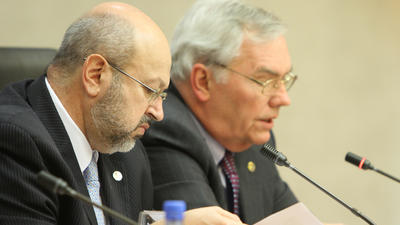-
Our work
-
Fields of work
- Arms control
- Border management
- Combating trafficking in human beings
- Conflict prevention and resolution
- Countering terrorism
- Cyber/ICT Security
- Democratization
- Economic activities
- Education
- Elections
- Environmental activities
- Gender equality
- Good governance
- Human rights
- Media freedom and development
- Migration
- National minority issues
- Policing
- Reform and co-operation in the security sector
- Roma and Sinti
- Rule of law
- Tolerance and non-discrimination
- Youth
- Field operations
- Projects
-
Meetings and conferences
- Summit meetings
- Review Conferences
- Ministerial Council meetings
- Plenary meetings of the Permanent Council
- Plenary Meetings of the Forum for Security Co-operation
- Security Review Conferences
- Annual Implementation Assessment Meetings
- Economic and Environmental Forum
- Economic and Environmental Dimension Implementation Meetings
- Human rights meetings
- Media conferences
- Cyber/ICT security conferences
- Conference of the Alliance against Trafficking in Persons
- Gender equality conferences
- Annual OSCE Mediterranean conferences
- Annual OSCE Asian conferences
- Partnerships
-
Fields of work
-
Countries
- All
-
Participating States
- Albania
- Andorra
- Armenia
- Austria
- Azerbaijan
- Belgium
- Belarus
- Bosnia and Herzegovina
- Bulgaria
- Canada
- Croatia
- Cyprus
- Czechia
- Denmark
- Estonia
- Finland
- France
- Georgia
- Germany
- Greece
- Holy See
- Hungary
- Iceland
- Ireland
- Italy
- Kazakhstan
- Kyrgyzstan
- Latvia
- Liechtenstein
- Lithuania
- Luxembourg
- Malta
- Moldova
- Monaco
- Mongolia
- Montenegro
- The Netherlands
- North Macedonia
- Norway
- Poland
- Portugal
- Romania
- Russian Federation
- San Marino
- Serbia
- Slovakia
- Slovenia
- Spain
- Sweden
- Switzerland – OSCE Chairpersonship 2026
- Tajikistan
- Türkiye
- Turkmenistan
- Ukraine
- United Kingdom
- United States of America
- Uzbekistan
- Asian Partners for Co-operation
- Mediterranean Partners for Co-operation
-
Structures and institutions
- Chairpersonship
-
Secretariat
- Secretary General
- Office of the Secretary General
- Conflict Prevention Centre
- Transnational Threats Department
- Office of the Special Representative and Co-ordinator for Combating Trafficking in Human Beings
- Office of the Co-ordinator of OSCE Economic and Environmental Activities
- Gender Issues Programme
- Opportunities for Youth
- Department of Human Resources
- Department of Management and Finance
- Office of Internal Oversight
- Documentation Centre in Prague
- Institutions
-
Field operations
- Presence in Albania
- Centre in Ashgabat
- Programme Office in Astana
- Programme Office in Bishkek
- Mission to Bosnia and Herzegovina
- Programme Office in Dushanbe
- Mission in Kosovo
- Mission to Moldova
- Mission to Montenegro
- Mission to Serbia
- Mission to Skopje
- Project Co-ordinator in Uzbekistan
- Closed field activities
- Parliamentary Assembly
- Court of Conciliation and Arbitration
- Organizational structure
- About us
Press release
OSCE Secretary General hosts meeting to promote co-ordinated response to developments in southern Mediterranean

- Date:
- Source:
- OSCE Secretary General
VILNIUS, 6 December 2011 – A meeting of international and regional organizations to promote closer co-ordination of responses to changes in the southern Mediterranean was held by OSCE Secretary General Lamberto Zannier and UN Under-Secretary-General for Political Affairs B. Lynn Pascoe in Vilnius today.
The meeting, which took place on the margins of the OSCE Ministerial Council, brought together representatives of the League of Arab States and the Organization for Islamic Co-operation with counterparts from the EU, NATO, the Council of Europe, the Collective Security Treaty Organization and the Conference on Interaction and Confidence Building Measures in Asia, as well as the OSCE and the UN.
“Throughout this year, as we have seen dramatic changes unfold in North Africa and the Middle East, the UN Secretary-General has encouraged greater co-operation among regional organizations in responding to those changes and reaching out to the states and societies of the region. I fully support that initiative,” said Zannier.
“The OSCE has accumulated a wealth of experience in supporting the development of democracy in its own participating States. Some of the areas where we have developed tools and expertise, such as elections, media freedom, democratic policing and good governance, to name a few, could be particularly relevant to transition processes across the Southern Mediterranean.”
Pascoe said: “Since the inception of the uprisings in the Middle East and North Africa region, the work of the UN has been two-fold – direct engagement with regional leaders and transitional authorities as well as co-ordinating international assistance and action, both on the ground and in the decision-making processes. Thus, today’s event is propitious and timely.”
He urged the meeting participants to identify possible contributions of each organization and consider options for inter-organizational sharing of expertise and practices.
The meeting also highlighted the importance of local ownership of any initiatives. Zannier, citing the OSCE’s experience, emphasized the need to avoid a “one size fits all” approach in providing support.
Ambassador Mikhael Wehbe, representing the League of Arab States, said: “The League of Arab States and the OSCE have a responsibility towards the changes that are happening in the Arab region. The 'Arab Spring' has aroused hope in a more free, democratic and peaceful world. We have to pay respect to the demands of the Arab people and support their aspirations.”